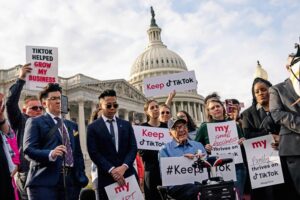
The National Interest Foundation Newsletter
Issue 229, March 22, 2024
Welcome to our NIF Newsletter. This week, we delve into the validity behind the assertion that Israel is using starvation as a weapon of war in Gaza and the widespread warnings against a potential Rafah military offensive, analyze how President Biden and other U.S. elected officials have backed Senator Schumer’s criticism of Israeli Prime Minister Netanyahu, examine why human rights groups have denounced the European Union’s $8 billion aid package to the El-Sisi regime in Egypt, and investigate U.S. legislation regarding TikTok and its hidden motives.
Validity of the Assertion That Israel is Using Starvation as a Weapon of War in Gaza

Israel has carried out attacks on food distribution centers and civilians seeking humanitarian aid. (Photo from AP)
Validity of the Assertion That Israel is Using Starvation as a Weapon of War in Gaza
This week, the European Union’s (EU) foreign policy chief Josep Borrell stated that Israel is using starvation as a weapon of war in Gaza and provoking famine. The top EU diplomat’s remarks echo what prominent human rights groups have been asserting for several months. Analysts point to evidence of Israeli attacks on food distribution centers and civilians seeking aid, as well as deliberate efforts to impede the delivery of humanitarian assistance such as food and water. Just this past week, an Israeli military strike against a food distribution center in Gaza killed or injured more than 20 humanitarian workers. The heightened focus on the harmful impact that Israel’s war policies have had comes amid an array of voices warning against a potential further Israeli military offensive in Rafah, and the devastation it would cause in exacerbating the already dire humanitarian conditions in Gaza. The prospect of an incursion into Rafah has elicited global alarm due in part to the fact that approximately 1.5 million displaced Palestinians are sheltering there.
Human Rights Watch (HRW) has previously tried to draw attention to Israel’s use of starvation as a weapon of war through the country’s policies and behavior during the past five months. HRW has documented evidence of Israel’s blatant efforts to impede humanitarian aid, as well as public statements from Israeli officials expressing an aim of depriving Gazan civilians of food and water. Regarding the latter, they point to remarks made by high-ranking Israeli officials including Defense Minister Yoav Gallant, National Security Minister Itamar Ben-Gvir, and Energy Minister Israel Katz. The human rights watchdog organization also cited a report by the United Nations World Food Programme (WFP) that delved into the scarcity of food in Gaza as far back as early December. Israel’s actions in Gaza represent a serious violation of international humanitarian law, which prohibits the starvation of civilians as a method of warfare. The Rome Statute of the International Criminal Court outlines that “depriving civilians of objects indispensable to their survival, including willfully impeding relief supplies” is a war crime. One of the other troubling occurrences is the Israeli military’s repeated unlawful attacks against food distribution centers, medical facilities, and civilians seeking humanitarian aid. A particular incident late last month when more than 100 Palestinians were killed and over 700 others wounded after Israeli troops opened fire on civilians waiting for food aid southwest of Gaza City drew universal outrage and condemnation.
In recent days, the Integrated Food Security Phase Classification (IPC) – a group of experts who are the world’s leading authority on hunger – warned that famine is “imminent” in northern Gaza and at risk of happening any time between now and May. The IPC’s report on the issue determined that the enclave’s entire population is facing high levels of acute food insecurity. Since its founding around 20 years ago, the organization has only ever classified a famine twice, once in Somalia and once in South Sudan, and thus its analysis on the severity of the situation in Gaza is particularly eye-opening. Furthermore, the report highlighted how the grave humanitarian crisis is an entirely man-made disaster, lending additional credence to Israel’s culpability for what has taken place in Gaza. Unlike other food insecurity crises which are often times brought about by extreme weather and drought, the IPC findings outlined the human-created catastrophe in Gaza and how it can be alleviated through the implementation of a ceasefire, the opening of more border crossings, and an increase in the delivery of much-needed aid. Alarmingly, the IPC also drew attention to the spike in the number of young children who are acutely malnourished, which is now about one out of every three children under the age of two years old in northern Gaza.
If Israeli authorities go through with plans to launch a calamitous assault on Rafah in the coming weeks, the humanitarian conditions in areas of central and southern Gaza are at risk of degenerating into famine as well. As a result, there have been widespread warnings towards Israel regarding a potential military offensive in Rafah. U.S. President Biden has cautioned Israeli Prime Minister Netanyahu against a ground invasion into the city of Rafah, where an estimated 1.5 million displaced Palestinians are sheltering from the onslaught of ongoing Israeli bombardment. U.S. National Security Adviser Jake Sullivan told reporters earlier this week that Biden has communicated to Netanyahu that an assault on Rafah would be a “mistake” as it would lead to more innocent civilian deaths, exacerbate the already dire humanitarian crisis, and further isolate Israel internationally. It has emerged this week that Biden asked Netanyahu to send a team of officials to Washington D.C. to discuss concerns about any potential Rafah military offensive. President Biden has voiced his issue with Israeli military operations not being connected to a clear war strategy. In addition to the United States, an array of countries have also warned Israel against a military campaign in Rafah. This includes most European nations, Canada, Australia, New Zealand, Egypt, Jordan, and South Korea – among many others.
In yet another act of defiance towards President Biden, the United States, and the global community at-large, Israeli Prime Minister Netanyahu renewed his pledge this week to launch a military offensive on Rafah. Netanyahu did so less than a day after Biden’s latest warnings against such a move and with plans on the table to send a delegation of Israeli officials to Washington D.C. in the coming days. It remains to be seen what comes out of these soon-to-be talks, but what is certain is that the approximately 1.5 million displaced civilians who have taken refuge in Rafah have nowhere else to go, and thus an Israeli military offensive there would be an abhorrent disregard for the respect of humanity and international diplomacy.
President Biden and Other U.S. Elected Officials Back Senator Schumer’s Criticism of Netanyahu

U.S. Senator Schumer’s recent criticism of Netanyahu is part of a growing trend of discontent with the Israeli leader. (Photo from Reuters)
President Biden and Other U.S. Elected Officials Back Senator Schumer’s Criticism of Netanyahu
Recently last week, U.S. Senator Chuck Schumer (D-NY) called for elections in Israel, stating that Israel’s Prime Minister Benjamin Netanyahu had “lost his way.” Schumer, a long-time supporter of Netanyahu and the highest-ranking Jewish official in the U.S. government, is one of a growing list of elected officials that have criticized Israel’s leader and the handling of the War on Gaza. Sharing and supporting Schumer’s sentiments was President Biden, who later told Ireland’s prime minister that Schumer “expressed serious concerns shared not only by him but by many Americans.” Similarly, U.S. Senator Chris Van Hollen (D-MD) recently denounced Israel’s longstanding and debunked allegations that the humanitarian agency UNRWA is a proxy group for Hamas, stating that “the claims that Prime Minister Netanyahu and others are making, that somehow UNRWA is a proxy for Hamas, are just flat-out lies.” This aligns with what impartial analysts have been emphasizing for years – that Netanyahu and other hardline Israelis have been trying to taint and disband the organization for political reasons.
The escalating criticisms reflect growing disdain among U.S. officials who have become alarmed with the manner in which Netanyahu is conducting the War on Gaza. Schumer, Biden, and Van Hollen, among other elected officials and government spokespeople, have become increasingly weary of the disturbing humanitarian toll that has been incurred since the onset of Israel’s military offensive and the lack of aid that is being allowed into Gaza. Other aspects of discontent have been centered around Israel’s plans to invade Rafah, a move that U.S. officials have repeatedly and consistently warned against, with Netanyahu seeming insistent nevertheless. U.S. leaders are increasingly concerned over the further humanitarian calamity that an Israeli military offensive in Rafah would spur, with U.S. Secretary of State Antony Blinken remarking that “we have to see a clear and implementable plan” to safeguard innocent people from an Israeli incursion, but “we have not seen such a plan.” Analysts have pointed out the problematic nature of Netanyahu continuing to disregard U.S. input, despite receiving billions in military aid.
In retaliatory statements, Netanyahu claimed that Schumer’s call for an election was “totally inappropriate” and baselessly stated that Israelis supported his desire to “destroy the remaining Hamas terrorist battalions,” something that experts say is wildly unrealistic and unattainable. Netanyahu also contended that Israel is “not a banana republic” and that “the people of Israel will choose when they will have elections, and who they’ll elect, and it’s not something that will be foisted on us.” This is an ironic statement given that a majority of Israelis want early elections, which according to Axios polls, suggest that if an election were to be held, Netanyahu would likely be defeated by his political rival, Minister Benny Gantz. Netanyahu’s hypocrisy is also evident to see, as he himself has been credibly accused many times of meddling in U.S. politics. One of Netanyahu’s most blatant involvements was during the 2012 election cycle, when he threw his support behind Republican presidential candidate Mitt Romney – attempting to make himself and Israel an influential factor in the election. Netanyahu has a long history of defying U.S. presidents and officials, as exhibited in his fight against former President Barack Obama for an Iran nuclear deal and his subsequent acceptance of a Republican invitation to address U.S. Congress in opposition to Obama’s efforts. Netanyahu seems to be eager to selectively decide what constitutes political interference and the will of the people.
In the Annual Threat Assessment from the Director of National Intelligence, it was determined that Netanyahu’s viability as prime minister may be in jeopardy due to Israeli discontent. Public displeasure in the United States has also been shown to be on the rise, as according to recent AP-NORC surveys, Americans are increasingly disapproving of Israel’s military actions in Gaza. The data reveals that 50% of the general public believes that Israel’s operations in the Gaza Strip have gone too far, which includes 60% of Democrats. For this reason, a growing number of lawmakers, human rights activists, and other concerned citizens have urged for the United States to condition its military aid to Israel. It is clear that frustrations regarding Israel’s handling of the war are expanding among both the U.S. public and elected officials. So far, the Biden administration’s approach has been described by some observers as “passive-aggressive,” with escalating rhetoric but stopping short of withdrawing support. However, a potential Israeli military offensive in Rafah could be a turning point, with reports indicating that President Biden would consider conditioning military aid to Israel should they go through with the assault.
Human Rights Groups Denounce the European Union’s $8 Billion Aid Package to the El-Sisi Regime in Egypt

The move has been criticized because of Egypt’s poor human rights record under El-Sisi. (Photo from Getty Images)
Human Rights Groups Denounce the European Union’s $8 Billion Aid Package to the El-Sisi Regime in Egypt
The European Union (EU) announced a 7.4 billion Euro ($8.1 billion) aid package and a movement towards closer ties with Egypt. This new agreement designates Egypt’s relationship with the EU as a “strategic partnership” and is aimed at addressing migratory flows. It is meant to boost cooperation in key sectors such as energy and security, while supporting Egypt’s faltering economy. Some commentators have stressed that the real motivation behind the aid package is to boost the Egyptian economy and create stability to prevent migration to EU countries. Egypt’s population of around 106 million is currently facing economic adversity, and has seen an influx of 9 million migrants and refugees, mostly from Sudan and Syria. Human rights groups such as Human Rights Watch (HRW), Amnesty International, and others have been critical of the EU’s decision to send aid to Egypt, citing the El-Sisi regime’s brutal repression and rights abuses. The EU is providing a repressive regime the resources to viciously control migrants, as Egyptian authorities under El-Sisi have been known to commit these types of violations.
According to HRW reports, authorities have wrongfully detained and mistreated migrants, asylum seekers, and refugees, regularly deporting them to other countries as well. The approach of cash-for-migration control has been a hallmark of EU policy, and has been exacerbated under European Commission President Ursula von der Leyen. It exposes the EU’s complicity in abuses and contradicts its founding principles, undermining its credibility on the world stage. Not only does this aid package leave a stain on the EU’s reputation, but has also been tried and failed in the past with other repressive regimes in countries such as Tunisia and Mauritania. HRW claims that “the blueprint is the same…stop migrants, ignore abuses.” HRW emphasizes that this practice strengthens autocratic rulers, and betrays human rights defenders who have suffered at the hands of the repressive regimes.
Since he overthrew Egypt’s democratically-elected president through a military coup in 2013, El-Sisi has run a repressive autocratic regime that frequently commits human rights abuses. The V-Dem Institute categorizes Egypt as an electoral autocracy, meaning that while there are elections, they are neither free nor fair and the government fails to uphold liberal principles such as the rule of law and freedom of expression. The El-Sisi regime has been documented massacring protesters, jailing and torturing thousands of critics and opponents including journalists, and handing down unfair sentences in sham trials. Independent media and civil society, cornerstones of a healthy democracy and avenues for civil change, are heavily stifled by Egyptian authorities. This repression is carried out by the powers of the judiciary and the military, both obedient arms of the El-Sisi government. These are just a few of the abuses committed under the El-Sisi regime that the EU’s funds would function as support for. It should be noted that the EU is not the only international actor providing Egypt with an economic crutch. The International Monetary Fund (IMF) and the United Arab Emirates have also given billions to Egypt’s depleted reserves. These transfers, HRW claims, ran rife with corruption and was in some ways detrimental to Egyptians’ economic rights.
EU diplomats claim that Egypt’s strategic importance has been underscored by their role in the War on Gaza, where Egypt is mediating between Israel and Hamas. While Egypt may be of strategic importance, it does not dismiss the fact that the EU is directly funding a repressive regime that will continue to engage in these human rights violations as long as it has the resources to do so. A propped-up economy will assist El-Sisi in maintaining a grip on power and patronage flows to his repressive security apparatus. A bolstered economy could also keep citizens complacent with the El-Sisi regime, possibly gifting conditions that shield from justifiable opposition. Social justice activists have rightly pointed out that aid packages of this size need to be predicated and conditioned on the protection of human rights. The EU should hold the El-Sisi regime accountable for its actions, or else risk tarnishing its desired image as a protector of democracy and human rights.
TikTok Legislation and the Hidden Motives

Free speech advocates are pushing back against a potential nationwide ban of TikTok. (Photo from Getty Images)
TikTok Legislation and the Hidden Motives
A bill that could ban TikTok in the United States if the social media platform’s Chinese parent company does not divest from it was recently passed last week by the U.S. House of Representatives. Its fate in the U.S. Senate remains unclear, however, as leadership in the upper chamber of Congress has expressed that it will review the text but without committing to a vote timeline. If enacted, the legislation would force ByteDance – the Chinese technology company which owns TikTok – to sell the popular platform before app stores would otherwise begin prohibiting access to it in the United States. The bill passed in the U.S. House by a vote of 352-65, and President Biden has expressed that he would sign the bill if it goes through both chambers of Congress. Proponents of the legislation argue that under its current ownership, TikTok poses a national security threat to the United States as it could allow the Chinese Communist Party (CCP) to spy on and manipulate Americans. However, on the other hand, opponents of the bill contend that it violates the First Amendment rights of users when it comes to freedom of speech and the access of information.
Lawmakers and others who support the potential ban insist that ByteDance is beholden to the Chinese government, and that the latter could demand access to the data of TikTok’s consumers in the United States whenever it wants to spy on Americans, push propaganda, or use the service to interfere in U.S. elections. TikTok has 170 million U.S. users, amounting to over half of the population using the platform, a fact that has elicited concerns over the app’s coercive capacity. This fear stems from Chinese national security laws that compel organizations to assist with intelligence gathering. TikTok has long denied that it could be used as a tool of the Chinese government, and has stated that it has never shared U.S. user data with Chinese authorities and would not do so even if it is asked. To date, there is no evidence to show that the social media platform has shared any such information with Chinese authorities, yet proponents of the bill are of the opinion that TikTok should not continue to operate in the United States under its current ownership structure.
Rights and civil liberty groups have come out against the proposed TikTok ban, saying that it would curtail freedom of speech and access to information, while undermining U.S. credibility as a defender of digital freedom. They point out how the social media platform allows both individuals and organizations to interact with others, disseminate information, and reach a wide audience – particularly when it comes to the younger demographic of U.S. adults. For many of these groups themselves like Amnesty International, Human Rights Watch, and the American Civil Liberties Union (ACLU), TikTok has become a space where they can interact with people on important issues and provide them with a means to engage in social and political activism. Opponents of the legislation also emphasize that the concerns regarding national security which are behind it can be addressed with measures short of a full-blown ban that would hinder free speech and set a dangerous precedent which could grant legitimacy to authoritarian regimes to shut down services that they do not support. For example, instead of a complete ban, a consumer data privacy bill would improve online data security. Domestically, the First Amendment includes the right to obtain information without government interference, and so the federal government banning the platform in the United States would prevent citizens from communicating through a method of their choosing.
Legal experts have highlighted that even if a TikTok ban was to be instituted, something that would require a number of steps first – the legislation to be passed in both houses of Congress, it to be signed into law by President Biden, and for the six-month period of time to come and go without it being sold – the ban could still be prolonged by court challenges as well. This is precisely what happened back in 2020, when then-President Donald Trump issued an executive order declaring a national emergency that would have shut down the platform. In response to this, TikTok sued the Trump administration, arguing that the executive order violated due process and First Amendment rights. The courts proceeded to block the ban on the grounds that Trump’s executive order exceeded statutory authority by targeting forms of personal communication and informational materials. According to analysts, a potential future attempt to ban TikTok would likely be countered by a First Amendment challenge from the social media platform and its content creators and users, and the case may even end up before the United States Supreme Court. Additionally, experts contend that shutting down a social media platform for purported national security concerns is something that can only be realistically accomplished if the threat is overwhelming. In the absence of this, it will probably be deemed an infringement on the First Amendment rights of millions of Americans.
Ultimately, by contemplating the potential ban, lawmakers in Congress are trying to balance security concerns with a desire to not infringe on freedom of speech protections. Whether the bill will pass in the U.S. Senate is difficult to predict, as it will likely be a long and rigorous process. Deliberation on the issue is a tricky task for lawmakers, and only time will tell what transpires in the U.S. Senate and beyond moving forward.
Enter the text or HTML code here
